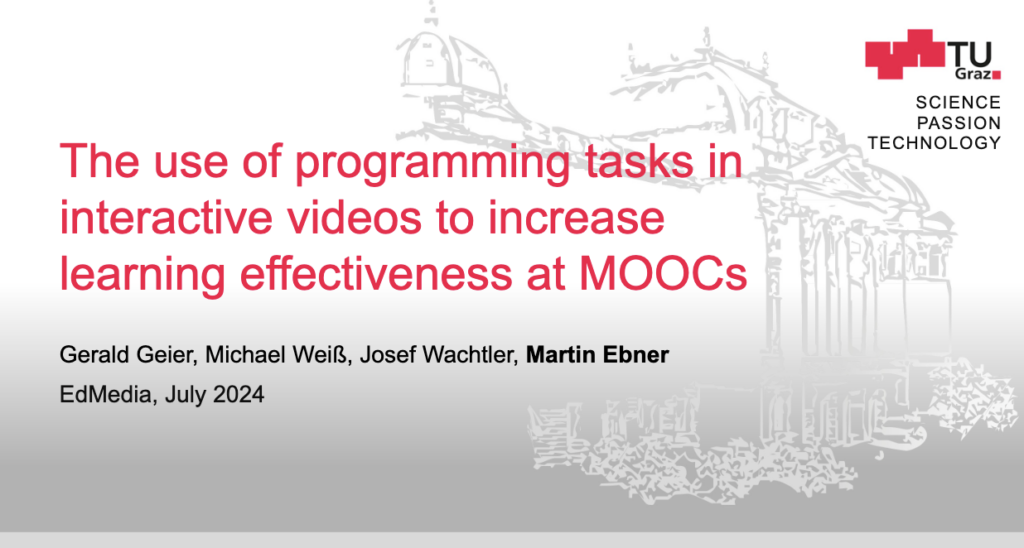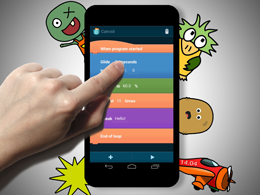Our first presentation at this year’s ED-Media conference is „The use of programming tasks in interactive videos to increase learning effectiveness at MOOCs„. Find here our slides:


Digitale Lehre an und rund um der Technischen Universität Graz
Our first presentation at this year’s ED-Media conference is „The use of programming tasks in interactive videos to increase learning effectiveness at MOOCs„. Find here our slides:

 Wir biegen in die Zielgerade bei unserem MOOC „Learning to Code: Programmieren mit Pocket Code„. Und wir wollen, dass man das bisherige Gelernte einsetzt und damit einfach Spaß hat:
Wir biegen in die Zielgerade bei unserem MOOC „Learning to Code: Programmieren mit Pocket Code„. Und wir wollen, dass man das bisherige Gelernte einsetzt und damit einfach Spaß hat:
In diesem Kapitel bist du an der Reihe, du hast die Aufgabe euer eigenes Programm von Grund auf zu entwickeln. Dieses Programm kann ein Spiel, Animation oder auch ganz was anderes sein. Du kannst natürlich alte Programme oder Konzepte von der vorigen Kapiteln verwenden.
Wie macht man mit? Das geht immer und jederzeit, einfach auf iMOOX registrieren und hier anmelden – viel Spaß allen.
Our article about „From refugee to programmer? A framework for a collaborative coding program for higher education institutions“ got published in the Journal of Research in Innovative Teaching & Learning.
Abstract:
Purpose
The purpose of this paper is to share the lessons learned in teaching programming skills to refugees during a time when circumstances were changing quickly and constantly and the needs of the target group were not well known.Design/methodology/approach
The integration of refugees poses serious challenges for the hosting society’s education system. A large number of refugees can put a strain on all kinds of public resources, and difficulties with differences in languages, previous curricula, falling behind due to having to spend time outside of education, and psychological traumas have to be expected. In response to the refugee crisis and in order to manage mass migration, the adaptive nature and rapid development of civic approaches can contribute to overcoming some of these challenges. To evaluate the impact of civic approaches, the authors have paid attention to refugees{code} an Austrian coding school for refugees which was developed by the civic community and which shows great potential in terms of providing rapid, innovative and adaptive kinds of educational support for refugees, as well as helping to combat the lack of programmers in the Austrian job market.Findings
As the great potential that initiatives like refugees{code} have for education, there are also substantial challenges. As we learned from the first course, course completion rates were very low. Therefore, it is important to build an infrastructure and a learning environment around the course. This learning environment includes providing mentoring and support, creating spaces where participants can learn. It was also found that having a pedagogically trained staff who is sufficient in the English language, too, is necessary to cater to a heterogeneous group. Also varying teaching strategies according to the needs and skills of the learner is necessary. One of the issues that confronts projects like refugees{code} is also receiving legal status. The collaboration with universities and colleges can be greatly helpful because they are already familiar with the structure of public authorities as well as with heterogeneous groups. Initiatives like refugees{code} are agile and flexible and know how to take advantage of that. The authors conclude that bringing successful education to heterogeneous and culturally different groups is multi-faceted. It is not something any individual organization or project can do; it can only be the result of a system of different actors working together with traditional educational institutions.Originality/value
This research study reports on two courses of programming for refugees and seeks to offer practical advice for further research and for the implementation of such courses into the educational system. Therefore a framework is proposed which should be taken into account in case of doing similar work.
[article @ Journal’s Homepage]
Reference: Wolf, D., Ebner, M. (2018) From refugee to programmer? A framework for a collaborative coding program for higher education institutions, Journal of Research in Innovative Teaching & Learning, https://doi.org/10.1108/JRIT-09-2017-0024
Our publication about „It’s in your pocket: A MOOC about programming for kids and the role of OER in teaching and learning contexts“ at this year Open Education Global Conference in Delft got published right now.
Abstract:
Programming is considered as an essential skill in the 21st century. Visual programming languages and age-appropriate development environments allow an easy entry into this field. Nevertheless, it is very challenging to bring those skills in a very short time frame to schools, to their teachers, and to school children themselves. Therefore, Graz University of Technology started a Massive Open Online Course named “Learning to code: Programming with Pocket Code” which is intended to teach coding skills to school children as well as teachers in a very fast, flexible and effective way. The learning content within the course is published under an open license to allow the reuse, modification and dissemination of the materials in different teaching and learning contexts. In this research work, we will present structure and concept of the MOOC. A special emphasis will be given on how the MOOC can be used in school and on the fact, that the content can be disseminated in a variety of ways.
[Link to article @ ResearchGate]
[Link to article @ Conference Proceeding Database]
Reference: Grandl, M., Ebner, M., Slany, W., Janisch, S. (2018) It’s in your pocket: A MOOC about programming for kids and the role of OER in teaching and learning contexts.In: Conference Proceeding Open Educational Global Conference 2018. p. 9. Delft, Netherlands
 We are happy, because the first round in englisch language starts today. The MOOC „Learning to Code: Programming with Pocket Code“ is explicitly aimed at schoolchildren. But be aware that we do not want to train the whole world as computer scientists. On the contrary, we simply want people to understand how the world of tomorrow works, so that they can help shape the world of tomorrow. So register and join it for free.
We are happy, because the first round in englisch language starts today. The MOOC „Learning to Code: Programming with Pocket Code“ is explicitly aimed at schoolchildren. But be aware that we do not want to train the whole world as computer scientists. On the contrary, we simply want people to understand how the world of tomorrow works, so that they can help shape the world of tomorrow. So register and join it for free.
There are many prejudices and fears about programming. With the help of Pocket Code, particularly children will gain initial experience with programming. A simple and visual user interface enables a playful implementation of your own ideas.
The course is designed for children and young people (age group 10-14 years) as well as teachers of all subjects. The main content includes creating your own games, interactive animations and apps with Pocket Code. At first, the structure and functionality of the app get presented. The participants learn how to use basic programming concepts such as conditionals, variables, events or parallelism. It is up to the children whether they take the course on their own or together with their parents.
How can you join? Simply at any time, just register at iMOOX for free and go to the course page and join – have fun.